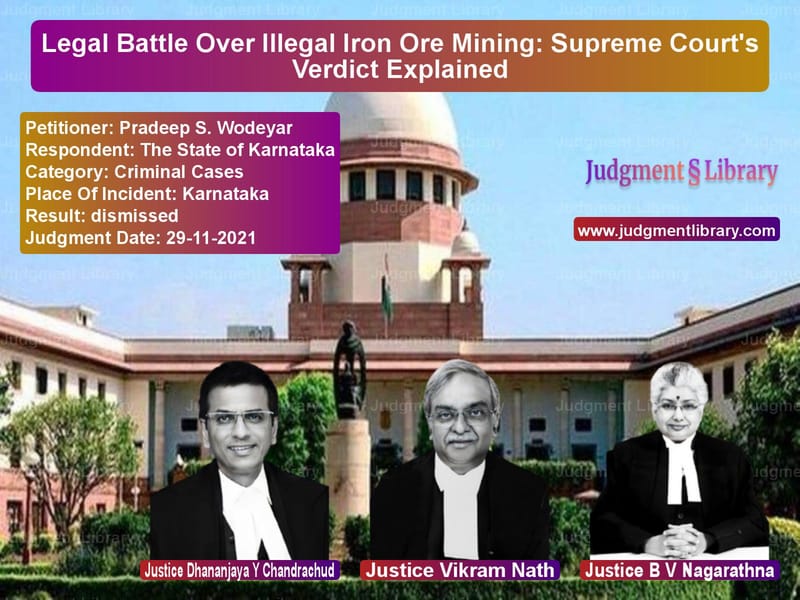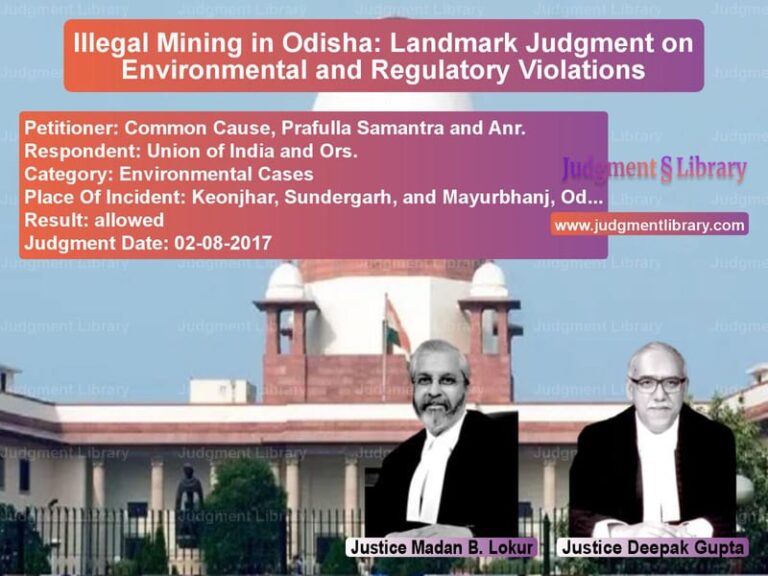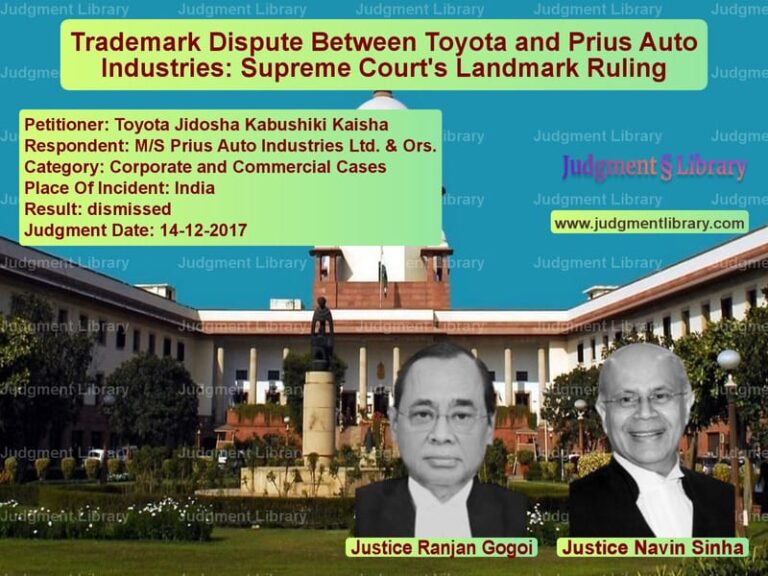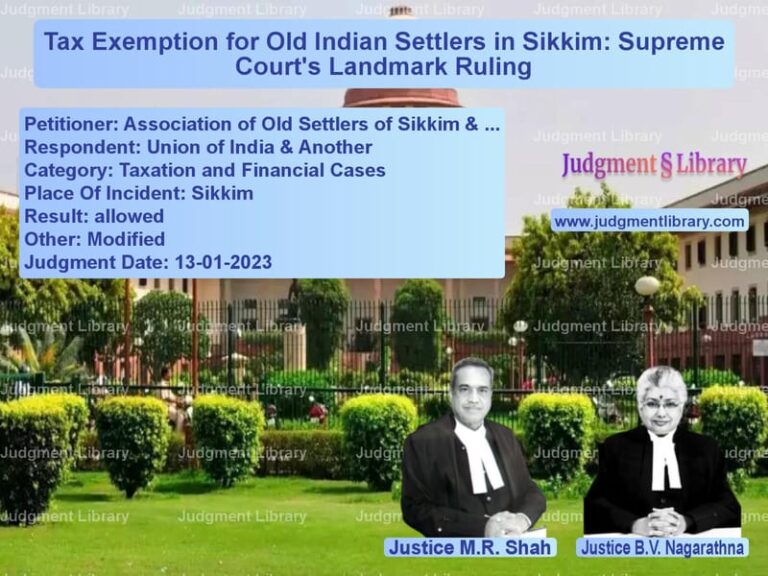Legal Battle Over Illegal Iron Ore Mining: Supreme Court’s Verdict Explained
The case before the Supreme Court of India involved a complex legal battle concerning illegal iron ore mining and transportation. The appellants, including Pradeep S. Wodeyar, were accused of exporting and transporting iron ore without valid permits, leading to significant losses to the state exchequer. The case stemmed from the findings of the Central Empowered Committee (CEC) and subsequent investigations by the Special Investigation Team (SIT) of the Karnataka Lokayukta.
The Facts
The primary accused, Pradeep S. Wodeyar, was the Managing Director of Canara Overseas Limited, while other directors and associates were also implicated. The allegations revolved around the illegal purchase, transport, and export of iron ore from Karnataka without the required permissions from the Forest Department and the Department of Mines and Geology. The SIT investigation, following directives from the Supreme Court, led to the filing of charge-sheets against the accused under various provisions of the Indian Penal Code (IPC), the Mines and Minerals (Development and Regulation) Act (MMDR Act), and Karnataka Forest Rules.
Arguments by the Petitioner
The appellants challenged the proceedings on several grounds, arguing that the Special Court’s order taking cognizance of the offences was flawed. They contended that:
- The Special Court lacked jurisdiction to take cognizance of the offence without the case being committed to it by a Magistrate.
- The order taking cognizance failed to specify the offences and reflected non-application of judicial mind.
- Pradeep S. Wodeyar was not personally involved in the transactions as he was residing in Indonesia during the alleged period.
- The Special Judge took cognizance of IPC offences, which was beyond the scope of the Special Court under the MMDR Act.
Arguments by the Respondent (State of Karnataka)
The State of Karnataka, represented by the prosecution, argued that:
- The Managing Director of a company is presumed to be responsible for its affairs unless proven otherwise during trial.
- The SIT report and complaint from the authorized officer provided sufficient material to take cognizance.
- Delay in raising objections to the jurisdiction of the Special Court indicated an attempt to delay proceedings.
- The principle of joint trial under Section 220 of the CrPC allowed the Special Court to try IPC offences alongside MMDR Act violations.
Supreme Court’s Analysis
The Supreme Court addressed the critical legal questions as follows:
1. Power of Special Court to Take Cognizance
The Court ruled that the Special Court could not take cognizance of the MMDR Act offences without a committal order from a Magistrate. However, it held that this irregularity did not vitiate the proceedings under Section 465 CrPC unless a failure of justice was demonstrated.
2. Cognizance of IPC Offences by Special Court
The Court determined that the Special Court could conduct a joint trial for IPC offences under Section 220 CrPC since the transactions formed part of the same offence. It noted that there was no express or implied repeal of this provision by the MMDR Act.
3. Jurisdictional Challenge and Delay
The Supreme Court emphasized that the accused had participated in the proceedings for over two years before challenging the cognizance order. The Court noted that procedural objections should be raised at the earliest to avoid unnecessary delays.
4. Vicarious Liability of the Managing Director
The Court reaffirmed that under Section 23 of the MMDR Act, a Managing Director is presumed to be responsible for a company’s acts unless proven otherwise. Since the charge sheet mentioned the involvement of Pradeep S. Wodeyar, the Court held that his role should be examined at trial.
Conclusion and Verdict
The Supreme Court dismissed the appeals, holding that the trial should proceed as the accused failed to demonstrate any failure of justice due to procedural irregularities. It emphasized the environmental impact of illegal mining and the need for strict enforcement of laws.
Petitioner Name: Pradeep S. Wodeyar.Respondent Name: The State of Karnataka.Judgment By: Justice Dhananjaya Y Chandrachud, Justice Vikram Nath, Justice B V Nagarathna.Place Of Incident: Karnataka.Judgment Date: 29-11-2021.
Don’t miss out on the full details! Download the complete judgment in PDF format below and gain valuable insights instantly!
Download Judgment: pradeep-s.-wodeyar-vs-the-state-of-karnata-supreme-court-of-india-judgment-dated-29-11-2021.pdf
Directly Download Judgment: Directly download this Judgment
See all petitions in Money Laundering Cases
See all petitions in Fraud and Forgery
See all petitions in Extortion and Blackmail
See all petitions in Attempt to Murder Cases
See all petitions in Judgment by Dhananjaya Y Chandrachud
See all petitions in Judgment by Vikram Nath
See all petitions in Judgment by B.V. Nagarathna
See all petitions in dismissed
See all petitions in supreme court of India judgments November 2021
See all petitions in 2021 judgments
See all posts in Criminal Cases Category
See all allowed petitions in Criminal Cases Category
See all Dismissed petitions in Criminal Cases Category
See all partially allowed petitions in Criminal Cases Category






